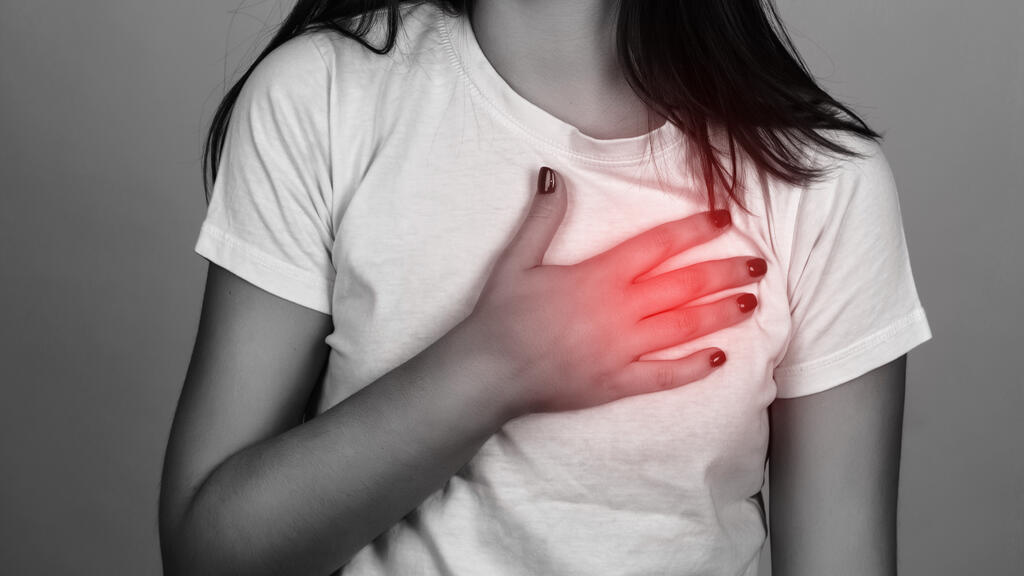Getting your Trinity Audio player ready...
Since October 7, Israeli cardiology departments have reported a sharp rise in cases of Broken Heart Syndrome, which closely mimics the symptoms of a heart attack but is entirely different.
Dr. Amnon Eitan, deputy director of the cardiology unit at Carmel Medical Center, explains that the main difference is that "the broken heart" looks and feels like a heart attack, but when examined, doctors find no blocked artery causing the heart attack.
According to Dr. Eitan, in cases of Broken Heart Syndrome, there is usually no lasting damage to the heart, even though the individual experiencing it often feels most of the symptoms of a heart attack, from chest pressure to changes in the EKG that resemble heart attacks. Dr. Eitan explains that if there is significant heart function impairment, it is treated with heart failure medications. "But in rare cases, you can even die from it."
Broken Heart Syndrome usually occurs after a sudden emotional stress event. "It's mostly negative emotions, whether it's unrequited love, deep sorrow, or loss of someone dear, like death in war, but it can also be something trivial like work anger, but it won't be a one-time anger, but something prolonged over time," explains Dr. Eitan.
He says that as a result of the war, three patients with trauma were hospitalized in his department, and one woman arrived with the syndrome after her son fell in the war.
Broken Heart Syndrome is distinctly related only to acute stress situations and not to other standard risk factors for heart attacks," explains Prof. David Pereg, director of the Cardiac Intensive Care Unit at Meir Medical Center.
"The phenomenon mainly occurs among women aged 50-60 and is characterized by a change in the shape of the heart. In fact, heart function is impaired, and it does not contract but rather expands, a condition called Apical Ballooning. The heart literally looks like a balloon," he specifies. The syndrome was first identified in Japan, where the heart's shape was linked to a trap traditionally used for catching octopuses, called Takotsubo in Japanese, which became one of its names."
The mechanism behind the syndrome is related to the release of adrenaline in the body following prolonged nervousness or stress, but doctors testify that in most cases, the event that caused Broken Heart Syndrome can be identified through conversation with the patient. Treatment primarily involves support, and if there is significant heart function impairment, standard heart failure medications are used.
Dr. Eitan explains that such an event may recur when there is a higher risk, especially among women who have experienced it before. However, nerves are not the only negative emotion that can adversely affect the heart. For example, anger or rage can also lead to a heart attack.
A severe fit of anger can cause a heart attack
Numerous studies have previously demonstrated the link between anger and stress and the risk of a heart attack, as well as an American study conducted on the latest drug that proved the immediate and direct effect of anger attacks on heart function.
The study, published in the Journal of the American Heart Association and conducted in collaboration with researchers from the Irving Medical Center at Columbia University, Yale Medical School, St. John's University in New York and other institutions, found that intense anger attacks could indeed impair blood vessel dilation, potentially leading to a heart attack.
Prof. Pereg compared the research findings to a familiar scene from many movies where during an anger attack, excitement, or receiving bad news, the movie star clutches their chest and sometimes even collapses from a heart attack. "This research aimed to examine if this connection holds true in reality," he says.
During the study, 280 young and healthy participants were divided into groups and asked to recall events that aroused various emotions in them, such as anger, sorrow, and anxiety, while the rest maintained a neutral state and constituted a control group.
Before, during, and after the emotional experiment, various biological parameters were examined, such as blood pressure, heart rate, and laboratory parameters related to blood vessel function, inflammation, and blood clotting, all of which are associated with an increased risk of developing a heart attack.
Within the emotions examined in the study, a physiological connection was found to anger alone, demonstrating its negative influence on artery function, which could elevate the risk of heart attacks. The research findings highlight the importance of anger management for heart health and may impact clinical recommendations for patients with heart disease.
However, Prof. Pereg adds a note of caution, stating that the researchers' conclusions are limited due to the conditions of the study. "The research results are intriguing, but there's a difference between emotions elicited in laboratory conditions and real-life emotions. A nerve stimulated in a laboratory setting cannot be equated with grief after the death of a loved one."
Indeed, despite the importance of the research and the significant insights it provides into heart health and anger management, its researchers acknowledge the need for further research involving a diverse demographic of patients who are not young and healthy. For example, studying patients with chronic anger problems who suffer from heart disease, vascular issues, or diabetes can help better understand the mechanisms involved and investigate anger's effects on various health risks.
The connection between stress and heart attacks
Dr. Eitan notes that in 1994, there was a sharp increase in heart attack rates in Los Angeles following a severe earthquake in the region. Increases in heart attacks have also been observed during wartime, severe economic downturns, and the COVID-19 pandemic.
"While the link between stress and heart attacks is known, the importance of the research lies in demonstrating the direct and immediate connection between the body and mind: acute emotional stress triggers a rapid biological response that increases the risk of a heart attack."
So why does this happen?
Researchers argue that the function of endothelial cells, responsible for blood vessel dilation, is a key factor. Impairment of their dilation is an early marker for atherosclerosis, a condition linked to heart diseases, heart attacks, strokes, and other disorders.
Prof. Pereg explains that such an event is called acute coronary syndrome, where the arteries supplying blood to the heart are suddenly and rapidly blocked, leading to a heart attack. "At the core of the disease lies atherosclerosis, where cholesterol and inflammatory cells build up in the lining of the heart arteries, forming plaque."
Prof. Pereg testifies that there are two possible outcomes: firstly, impairment of the heart's arteries' ability to dilate and constrict to meet the heart's blood supply needs, and secondly, arterial clot formation. According to him, a dangerous event occurs when a blood clot forms, blocking the artery acutely. If a tear occurs in this wall, the blood encounters the plaque contents, making the situation akin to an injury. "This can lead to blood clotting in a heart artery, potentially resulting in a heart attack."
So, is anger the crucial predictor?
According to Prof. Pereg, it's one of cardiology's holy grails. "It's closely related to blood pressure, blood flow, and heart rate. Hence, vigorous physical activity is generally very healthy, and it's also linked to other parameters, including mood. We know that when we get upset or excited, blood pressure rises. So, heart attacks have one of the most intuitive links between states of anger and excitement and heart problems." So, will calmness help prevent heart attacks?
Dr. Eitan says, "That's the million-dollar question. Interventions have never been proven to reduce the risk, but it's very logical. Generally, negative emotions are directly related to rapid heart rate, high blood pressure, and high cortisol release due to stress. All are associated with increased risk of atherosclerotic processes. It's important to remember that stress is also linked to other diseases, including diabetes, cancer, and more. Therefore, it's clear that reducing stress of all kinds is advisable, but the way to reduce stress will vary for each patient."
"Workload can be reduced, hobbies developed, and vacations taken. Physical activity and yoga are also linked to stress reduction, and in some cases, there is also room for psychological treatment. If there's one message that arises from the topic, it's mainly to try not to take things to heart, figuratively speaking."
Prof. Pereg adds, "Western lifestyles are full of pressure. We work long hours and try to push forward all the time, realizing our potential and time. Our bodies are not designed to work under such conditions. This needs to be taken into account in the most basic aspects of a healthy lifestyle, physical activity, and nutrition. These are intertwined and affect each other on our mental and physical health. Therefore, part of the recommendations for maintaining heart health includes reducing stress and pressure and being aware that mental stress negatively affects heart health."






